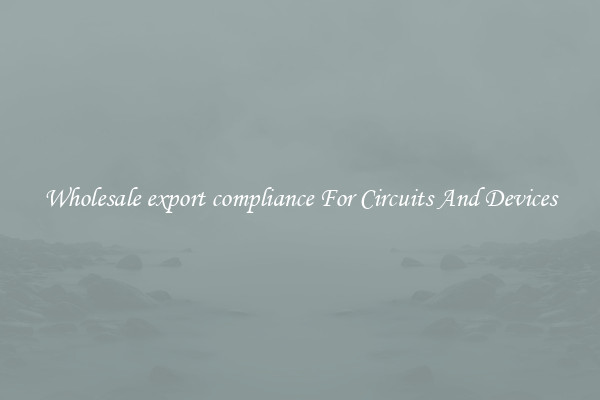Wholesale export compliance For Circuits And Devices
Wholesale export compliance is an essential aspect of the electronic circuits and devices industry. It ensures that companies abide by the laws and regulations surrounding the exporting of their products. With the global market becoming increasingly interconnected, it is crucial for businesses to understand and adhere to these compliance requirements.

Export compliance laws exist to control the export of sensitive information, technology, and products that could be used for military purposes, harm national security, or violate human rights. These regulations aim to prevent the unauthorized transfer of goods that could potentially end up in the wrong hands.
One of the key elements of wholesale export compliance is understanding the Export Administration Regulations (EAR). These regulations, enforced by the U.S. Department of Commerce, outline the rules and licensing procedures necessary for exporting certain products. It is important for companies to determine if their products fall under the jurisdiction of the EAR and, if so, comply with their requirements.
To ensure compliance, businesses must conduct due diligence and thoroughly assess their customers, partners, and suppliers. They should carefully screen all parties involved in the export process to prevent any potential violations. This includes conducting background checks, verifying end-use and end-user information, and identifying any red flags that may indicate suspicious activities.
Another crucial aspect of wholesale export compliance is maintaining accurate records. Companies must keep comprehensive records of their export transactions, documentation, and licensing procedures for a minimum of five years. These records serve as evidence of compliance and can be requested for review by government agencies or auditors.
Regular employee training is also vital for maintaining wholesale export compliance. Employees must be educated about the laws and regulations surrounding exports and be aware of their responsibilities in ensuring compliance. This training should cover topics such as proper documentation, recognizing warning signs for potential violations, and reporting any suspicions or concerns.
Non-compliance with wholesale export regulations can have severe consequences for businesses, including heavy fines, loss of export privileges, and even criminal charges. Therefore, it is imperative for companies to implement robust compliance programs and ensure that all employees are aware of and follow the necessary protocols.
Overall, wholesale export compliance is essential for the electronic circuits and devices industry to ensure the secure and responsible transfer of products across borders. By adhering to the laws and regulations surrounding exports, companies can protect national security, maintain their reputation, and contribute to a safer global marketplace.

View details

View details

View details

View details







